

The Bottom Billion – Paul Collier – A Summary. Global poverty has been falling for decades, but a few countries which are caught in four distinct traps (such as the resource curse) are falling behind and falling apart.
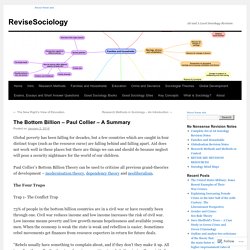
Aid does not work well in these places but there are things we can and should do because neglect will pose a security nightmare for the world of our children. Paul Collier’s Bottom Billion Theory can be used to criticise all previous grand-theories of development – modernisation theory, dependency theory and neoliberalism. The Bottom Billion: Why the Poorest Countries Are Failing and What Can Be Done About It - World Hunger. New York: Oxford University Press. 2007.
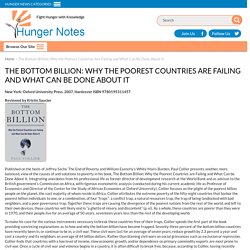
Hardcover ISBN 9780195311457 Reviewed by Kristin Saucier Published on the heels of Jeffrey Sachs’ The End of Poverty and William Easterly’s White Man’s Burden, Paul Collier presents another, more balanced, view of the causes of and solutions to poverty in his book, The Bottom Billion: Why the Poorest Countries are Failing and What Can be Done About It. Integrating anecdotes from his professional life as former director of development research at the World Bank and as advisor to the British government’s Commission on Africa, with rigorous econometric analysis (conducted during his current academic life as Professor of Economics and Director of the Center for the Study of African Economies at Oxford University), Collier focuses on the plight of the poorest billion people on the planet, the vast majority of whom reside in Africa.
Book Notes by David Mays. Paul Collier is Professor of Economics and Director of the Center for the Study of African Economies at Oxford University, and former director of Development Research at the World Bank.
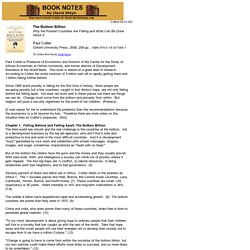
This book is based on a great deal of research. According to Collier the world consists of 5 billion well off or rapidly getting there and 1 billion falling further behind. Natinvest31. Resource Curse Definition. A nonrenewable resource is a resource of economic value that cannot be readily replaced by natural means on a level equal to its consumption.
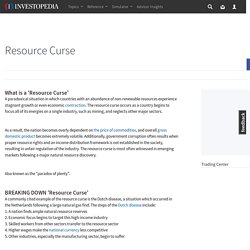
Most fossil fuels, such as oil, natural gas and coal are considered nonrenewable resources in that their use is not sustainable because their formation takes billions of years. BREAKING DOWN 'Nonrenewable Resource' Types of Nonrenewable Resources Fuels created from nonrenewable resources are still the primary source of all the power generated in the world, due to their affordability and high energy content. Can Lebanon escape the resource curse? After two-and-a-half years without a president, Lebanon’s parliament finally elected Michel Aoun to the post.
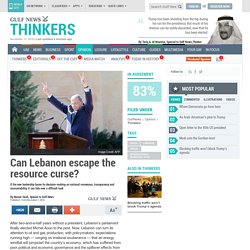
Now, Lebanon can turn its attention to oil and gas production, with policymakers’ expectations running high — verging on irrational exuberance — that an energy windfall will jumpstart the country’s economy, which has suffered from poor political and economic governance and the spillover effects from Syria’s civil war. Lebanon’s potential hydrocarbon wealth could indeed transform the country, as well as provide a model for other Middle Eastern energy producers to follow. Nrgi Resource Curse. Uganda's oil: lessons on governance and the resource curse. As fresh column inches are written about Uganda's oil resources (some exposing corruption allegations, others claiming that the government scarcely has enough money to begin refining) it is clear that managing a natural resource is a daunting challenge.
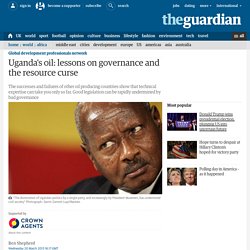
Uganda, anticipating commercial production in the next few years, has itself been gripped by intense debate. [link] Waste, corruption, environmental catastrophe and conflict in a country like Nigeria are a stark warning. The spectre of the "resource curse" looms large. Workingpaper81. Case study: Burkina Faso. Sustainable Livelihoods: how Christian Aid is reducing hunger and chronic poverty for Vulnerable Communities in Burkina Faso The Problem: • Burkina Faso remains one of the poorest countries in the world.
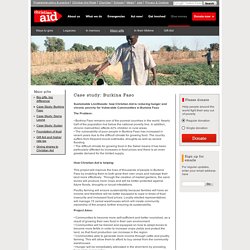
Nearly half of the population live below the national poverty line. In addition, chronic malnutrition affects 42% children in rural areas • The vulnerability of poor people in Burkina Faso has increased in recent years due to the difficult climate for growing food. Burundi – political violence - Case study. Following the end of the civil war in 2005, Burundi has made limited progress towards a more stable democracy.
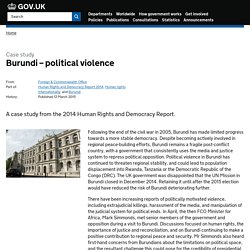
Despite becoming actively involved in regional peace-building efforts, Burundi remains a fragile post-conflict country, with a government that consistently uses the media and justice system to repress political opposition. Political violence in Burundi has continued to threaten regional stability, and could lead to population displacement into Rwanda, Tanzania or the Democratic Republic of the Congo (DRC). The UK government was disappointed that the UN Mission in Burundi closed in December 2014. Poverty and Crime: Breaking a Vicious Cycle of Discrimination. Poverty and crime have a very "intimate" relationship that has been described by experts from all fields, from sociologists to economists.
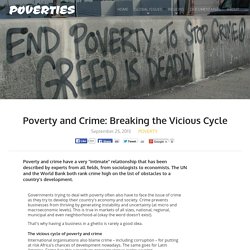
The UN and the World Bank both rank crime high on the list of obstacles to a country’s development. Governments trying to deal with poverty often also have to face the issue of crime as they try to develop their country's economy and society. Crime prevents businesses from thriving by generating instability and uncertainty (at micro and macroeconomic levels). This is true in markets of all sizes, national, regional, municipal and even neighborhood-al (okay the word doesn’t exist). Burundi – political violence - Case study. The relationship between terrorism and economic growth: Research. The estimated number of deaths from terrorism worldwide rose from 3,329 in 2000 to 32,685 in 2014, according to a November 2015 analysis by the Institute for Economics and Peace.
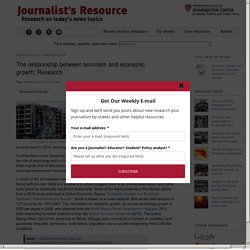
The vast majority of lives lost to terrorism in 2014 — 78 percent — took place in the five countries where most terrorism activity occurred: Iraq, Nigeria, Afghanistan, Pakistan, Syria. More than half of incidents claimed were attributed to Boko Haram and the Islamic State (ISIS or ISIL). The economics of violence. YESTERDAY it was Afghanistan and Congo. Today it is Côte d'Ivoire and Libya. Violence, it seems, is always with us, like poverty. And that might seem all there is to be said: violence is bad, it is worse in poor countries and it makes them poorer. But this year's World Development Report, the flagship publication of the World Bank, suggests there is a lot more to say. What keeps communities locked in the extreme poverty trap? To answer the question of what traps people in extreme poverty, we must first discuss what extreme poverty actually is. Extreme poverty is a state of subsistence living in which most, if not all, efforts are directed towards survival.
Extreme poverty has many direct consequences. What we are discussing here are the direct feedback effects that tend to cause cycles of deepening poverty on a community level. In another publication, we consider national and cultural issues that contribute to poverty and hamper development. Conflict and poverty: The economics of violence. There will be some short-term pain but Brexit will make us richer. Five immediate effects from Brexit. The short-term consequences of Brexit are severe – but financial disaster is not inevitable. England have just been ejected from Euro 2016 by Iceland. Is this an early example of the hapless future that lies ahead for Britain now that we have opted for exile from the richest economic zone on Earth? Or is it a demonstration of the mighty feats that even the tiniest of nations can achieve once freed from the EU yoke? The debate on the economic implications of Brexit before last week’s vote was fuelled by fantastic claims of epochal economic disaster and transformative economic opportunity made by both sides.
What does a more sober assessment of our prospects look like, the morning after? The economic impact of 'Brexit' - Woodford Investment Management LLP. Capital Economics has been commissioned by Woodford Investment Management to examine the United Kingdom’s relationship with Europe and the impact of ‘Brexit’ on the British economy. A referendum is due to be held before the end of 2017 but it looks increasingly likely that it will occur before the end of 2016. The latest opinion polls suggest an extremely tight vote but this could easily change due to, for example, another escalation in the Greek crisis, further rises in net migration from Europe or an escalation of the refugee crisis.
Five immediate effects from Brexit. Why Vote Leave - Vote Leave. G20: Is Theresa May changing the language of Brexit? Image copyright Getty Images George Orwell said that political language consists largely of "euphemism, question-begging and sheer cloudy vagueness". The same could be said about the post-referendum debate. Brexit: The phoney war. Brexit Britain: What has actually happened so far? UK and Australia hold 'preliminary' trade talks.